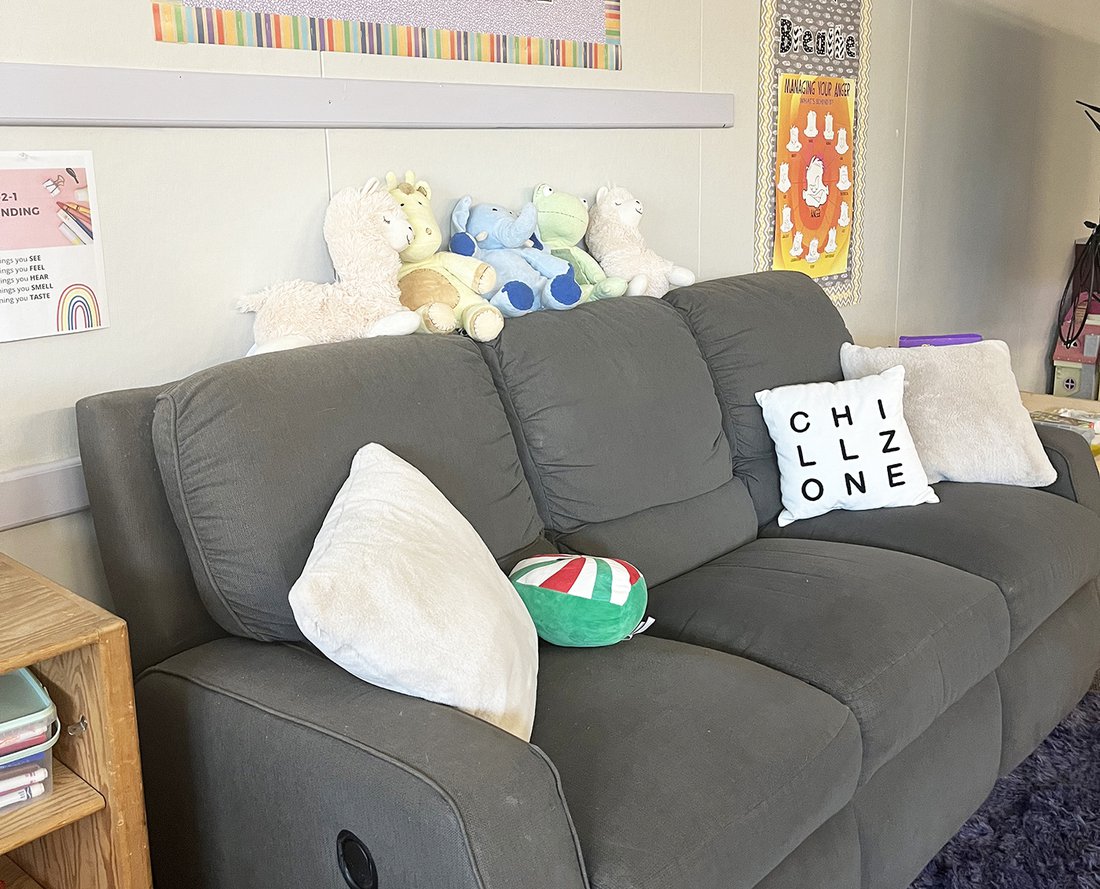
Auburn Elementary’s Wellness Center has staff (and stuffed animals) waiting for students who need a “wellness break.”
Wellness Center is ‘a place for kids to just be’
Elementary school serves student mental health needs and reduces behavior issues
June 26, 2023
Principal Erin Fischetti just experienced the joy of her school’s approach to mental wellness.
Fischetti was walking the halls of Auburn Elementary when a student approached her about an issue she had with another student from the day before. The student had visited the school’s Wellness Center and learned tools for resolving conflicts. At the end of their brief conversation, the student told Fischetti that she knew what her next step was: to tell the student how she feels.
“That felt really good,” Fischetti said, beaming. “When you have students holding each other accountable and going through that process themselves, that is huge.”
Auburn Elementary is one of 12 schools in Placer County that have recently established Wellness Centers on campus to give students a spectrum of mental health supports while reducing behavioral issues on campus.
Three years ago, Placer County received a $4 million grant from the state to establish wellness centers. The county looked at data on students experiencing homelessness and police interactions to determine the districts and schools where students needed extra supports, said Janine Hughes, director of Student Support for Auburn Union School District.
Like schools nationwide, Auburn Union School District has seen an influx of student trauma and behavioral issues since coming back to school from COVID lockdown.
“That’s a reflection of definitely coming back from COVID, but also everybody’s OK talking about it now.” said Hughes, who is also a licensed clinical social worker and has advocated for uniting schools and mental health for 20 years now. “We’re at that place where we can … bring those two things together and support our kiddos and families and [remove] those barriers so they can get back to the education piece.”
Fischetti’s first year as principal at Auburn Elementary was 2021-22. Although she had been a principal in schools with counselors before, she had never led a school with a wellness center.
“Honestly, I didn’t know what it was until I got here and realized that it was a place for kids to be able to have a break, have celebrations, get small group counseling or individual counseling — it’s a place for kids to be able to just be,” she said. “I don’t think I could do this job without the Wellness Center. I’m so grateful and I think every school should have one right now.”
When you walk into the Wellness Center, the lights are turned low — “You immediately feel relaxed,” Fischetti said. There are tables, a basket with fidget toys and stuffed animals. A poster on the wall lists emotions, so students struggling to verbalize how they are feeling can point to how they feel.
Teachers send students to the center with a pass whenever they need a “wellness break.” They are greeted by PCOE staff — a mental health specialist and family resource specialist — who work in the center every day. There are also confidential spaces for parent meetings or one-on-one counseling, making the space functional for families and staff, too.
More important than the physical space, Fischetti says a “wellness campus” approach is what makes these efforts successful.
“The Wellness Center doesn’t just exist in room 14 — it exists all throughout the campus,” Fischetti said, adding that social-emotional learning is infused in the PBIS curriculum, staff trainings and “calming corners” in classrooms.
Wellness Center staff document each time a student visits the center. When the site’s Wellness Team meets each week, they identify students who are coming to the center more frequently and follow up with the student’s teacher and family to offer extra support.
Services are responsive to needs at each site. At Auburn Elementary, for instance, there’s a “Math Anxiety Group” to teach coping skills to fourth-graders who are struggling.
“I think every school should have one right now.”
— Erin Fischetti, Principal, Auburn Elementary School, on Wellness Centers
The Wellness Center and curriculum are giving principals like Fischetti alternatives to traditional discipline. Fischetti says she has dramatically reduced suspensions just by having a place to “talk it out.” She often uses the Wellness Center for restorative circles, where she talks to students about how to resolve their problems.
Last year in Auburn Union School District there were 14 students recommended for expulsion. This year? Zero.
While acknowledging that school leaders are working with limited resources, Hughes said there are many ways to incorporate mental wellness at school sites.
“I would say just start,” she said. “You might not have a grant, you might not have that money coming in, but what can you do on that campus to really support that ‘whole child’ piece?”
Placer County Wellness Centers
How did Placer County Office of Education secure funding for 12 Wellness Centers in districts throughout the county? PCOE’s Executive Director, Prevention Supports and Services Michael Lombardo and Mental Health Director, Prevention Supports and Services Allison Murphy, LMFT, explain how they “braided” together funding — and how other LEAs can do the same.
“Learn about the types of Medi-Cal available, explore how your existing funding sources can be used to fund school-based mental health services,” Lombardo and Murphy advised. “Create partnerships with your COE, County Behavioral Health and other community-based agencies. This work takes a blended and braided funding model.”
Funding sources for PCOE Wellness Centers
Senate Bill 82 (Mental Health Crisis Triage) and Mental Health Student Services Act (MHSSA) dollars: These funds are provided by the Mental Health Services Oversight and Accountability Commission to selected counties. Both sources focus on integrated partnership with children’s behavioral health departments. As part of PCOE’s 32-year collaboration with Placer County’s Children’s System of Care, PCOE and Placer County CSOC submitted a joint application and asked local districts to submit an application to be selected to partner on the grant. (Triage: $1.2 million. MHSSA: $872,000 per year for five years)
Private grant: PCOE received a generous grant from Sutter Health Foundation to support a Wellness Center in a rural community in Placer County. ($500,000)
Local funds: LEAs also provide supplemental funding. ($483,000)
What it pays for
Staffing – Which includes Mental Health Specialists (licensed or license-eligible Marriage and Family Therapists, Clinical Social Workers and Professional Clinical Counselors); Family and Youth Community Liaisons (persons with lived experience navigating a challenging school or county system); and clinical supervision of these staff.
Implementation – Creation of a physical Wellness Center including items needed to support welcoming spaces.
Sustaining funding
Triage Grant ended June 23 (PCOE and Managed Care Plans will continue one more year of funding through Student Behavior Health Incentive Program — SBHIP). MHSSA grant and Sutter Health grant will both end in June 2024. To continue funding staff for its Wellness Centers, PCOE is exploring a variety of sources, including LEA Core Funds, grants, and Child Youth Behavioral Health Initiative reimbursement for mental health services through Medi-Cal and commercial insurance.
Triage Grant ended June 23 (PCOE and Managed Care Plans will continue one more year of funding through Student Behavior Health Incentive Program — SBHIP). MHSSA grant and Sutter Health grant will both end in June 2024. To continue funding staff for its Wellness Centers, PCOE is exploring a variety of sources, including LEA Core Funds, grants, and Child Youth Behavioral Health Initiative reimbursement for mental health services through Medi-Cal and commercial insurance.
Multi-tiered System of Supports at Auburn Elementary School
Tier 1: Interventions are for all students. Includes curriculum elements at the classroom-level, like “Caring Heart,” a morning exercise where students put their names inside or outside of a heart to indicate days when they need a little extra support. Students having a bad day may get a pass to go to the Wellness Center for a “wellness break.”
Tier 2: Interventions for some students. Include things like small group social skills sessions and daily check-ins with wellness center staff.
Tier 3: Interventions for few students. Would include services such as one-on-one counseling in the Wellness Center.
From left, Megan Baier, ACSA advocate; Sarah Voss Pereira, PCOE; Erin Fischetti, principal; Michael Lombardo, PCOE; Allison Murphy, PCOE; and Serette Kaminski, ACSA advocate.
PCOE Mental Health Specialist Sarah Voss Pereira, LMFT, gives a tour of Auburn Elementary’s Wellness Center.
PCOE Mental Health Specialist Sarah Voss Pereira, LMFT.
Auburn Elementary’s Wellness Center.
Contact Us
www.acsa.org
© 2023 Association of California School Administrators




